Spinone Italiano
The Spinone Italiano[lower-alpha 1] is an Italian breed of hunting dog, traditionally used for tracking, pointing, and retrieving game.[1][3][4][5]
| Spinone Italiano | |||||||||||||||||
|---|---|---|---|---|---|---|---|---|---|---|---|---|---|---|---|---|---|
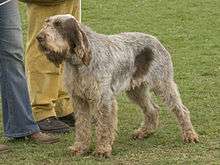 | |||||||||||||||||
| Other names |
| ||||||||||||||||
| |||||||||||||||||
| |||||||||||||||||
| Dog (domestic dog) | |||||||||||||||||
History
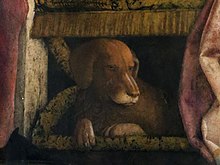
The origins of the Spinone are unknown.[1]:250 Rough-haired dogs of pointer type have been present in the Italian peninsula at least since the Renaissance. In a fresco painted by Andrea Mantegna in about 1470 in the Camera degli Sposi of the Palazzo Ducale of Mantova, in Lombardy in northern Italy, a dog of this kind is shown lying under the chair of the duke, Ludovico III Gonzaga.[1]:250 Jacques Espée de Sélincourt, in his Le Parfait Chasseur of 1683, says of griffon dogs that "the best come from Italy and from Piedmont".[6][7]:xxviii
The modern Spinone originated in Piedmont, in north-western Italy, in the nineteenth century, and was for some time the most important hunting breed of that region.[1]:250 During the Second World War it was much used by the partisans, both to track enemies and to carry food.[1]:250 After the War, breed numbers were much reduced; a breed society, the Famiglia dello Spinone, was formed in 1949.[8] The Spinone was definitively accepted by the Fédération Cynologique Internationale in 1955.[9] A second breed society, the Club Italiano Spinoni, was established in 1973.[8]
In the period from 2010 to 2018, new registrations in Italy varied from about 400 to about 650 per year; in every year, the orange-and-white colouring represented slightly over half of the total.[3]
Characteristics
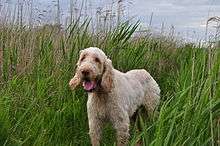
The Spinone has a square build (the length of the body is approximately equal to the height at the withers). It is a strong-boned, solidly built dog with a well-muscled body and limbs that are suited to almost any kind of terrain. A brown and white Spinone can sometimes be confused with a German Wirehaired Pointer by someone unfamiliar with the breeds. However, the long head and pronounced occipital are unique to the breed. He has an expression that shows intelligence and understanding and is often described as having human-like eyes. The tail of the working Spinone is customarily docked at half its length (approximately 14 to 20 cm or 5.5 to 8 inches from the base of the tail). Non-working UK based Italian Spinones are no longer docked, in accordance with current legislation. Even as adults, Spinoni retain disproportionate, puppy-like, webbed paws which make them powerful swimmers.[10]
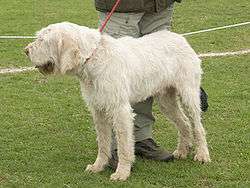
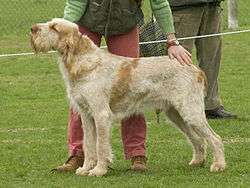
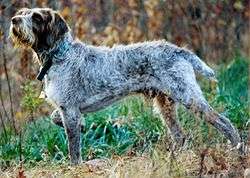
The coat is tough, slightly wiry, and close fitting. The preferred length is 4 to 6 cm (1.5 to 2.5 in) on the body; however, the ears, muzzle, head, and parts of the legs and feet are covered with shorter hair. Eyebrows have longer and stiffer hair; longer but softer hair covers cheeks and muzzle, creating a profuse moustache and beard.
It may be solid white, white with orange markings, orange roan with or without orange markings, white with brown markings, or brown roan with or without brown markings. Pigment of skin, nose, lips, and the pads on their feet should be a fleshy red-orange in white dogs, slightly darker in orange and brown roan dogs. The white and orange coloration is unique amongst the wire-haired gun dogs.[11]
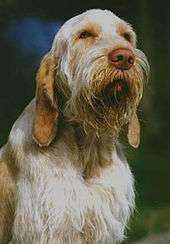
A Spinone usually lives for about twelve or thirteen years.[1]:250 Neurological disorders that have been identified in the breed include cerebellar abiotrophy[12]:308 and idiopathic epilepsy.[13]
See also
- Bracco Italiano
- Griffon
- Pointing breed
Notes
- Italian pronunciation: [spiˈnoːne itaˈljaːno]; plural Spinoni Italiani, pronounced [spiˈnoːni itaˈljaːni]
References
| Wikimedia Commons has media related to Spinone Italiano. |
- [Bruce Fogle] (2013). The Dog Encylopedia. London; New York: Dorling Kindersley. ISBN 9781465408440.
- Spinone Italiano (in Italian). Ente Nazionale della Cinofilia Italiana. Accessed July 2020.
- Spinone Italiano (in Italian). Ente Nazionale della Cinofilia Italiana. Accessed July 2020.
- Tamsin Pickeral (2014). Dogs Unleashed. San Diego: Thunder Bay Press. ISBN 9781626860681.
- Spinone (in Italian). Enciclopedie online. Roma: Istituto dell'Enciclopedia Italiana. Accessed July 2020.
- FCI-Standard N° 165: Spinone Italiano (Italian Spinone). Fédération Cynologique Internationale. Accessed July 2020.
- Jacques Espée de Selincourt (1683). [https://gallica.bnf.fr/ark:/12148/btv1b525127074/f38.image.r=selicourt%201683 LE PARFAIT CHASSEUR, pour l'instruction des personnes de qualité ou autres qui aiment la Chasse, pour se rendre capables de cét Exercice, apprendre aux Veneurs, Picqueurs, Fauconniers, & Valets de Chiens à servir dans les grands Equipages] (in French). Paris: Gabriel Quinet. "... les meilleurs viennent d'Italie & de Piemont".
- Fondazione (in Italian). Club Italiano Spinoni. Accessed July 2020.
- FCI breeds nomenclature: Spinone Italiano. Fédération Cynologique Internationale. Accessed July 2020.
- "Breed description".
- "Spinone Ital". AKC.
- Ronaldo C. Da Costa, Curtis W. Dewey (2015). Practical Guide to Canine and Feline Neurology, third edition, ebook. Ames, Iowa: John Wiley & Sons. ISBN 9781119062042.
- L. De Risio, R. Newton, J. Freeman, A. Shea (2015). Idiopathic Epilepsy in the Italian Spinone in the United Kingdom: Prevalence, Clinical Characteristics, and Predictors of Survival and Seizure Remission. Journal of Veterinary Internal Medicine 29: 917–924. doi:10.1111/jvim.12599
Further reading
- Larkin, Peter & Stockman, Mike (2003). The ultimate encyclopedia of dogs, dog breeds & dog care. Hermes House. ISBN 1-84309-128-3.
- Hall, Derek (2005). The ultimate guide to dog breeds. Regency House. ISBN 1-85361-516-1.
- Fry, Carolyn (1999). The Italian Spinone. Kingdom Books. ISBN 1-85279-084-9.